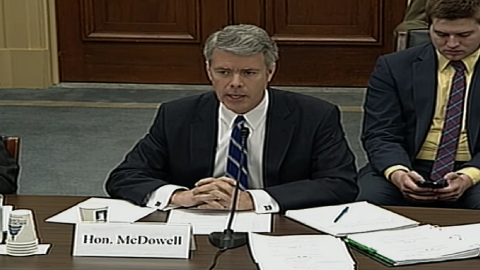Thank you Chairman Walden, Ranking Member Eshoo and Members of the Committee - it is an honor to testify before you again today.
Today I am testifying only in my personal capacity and not on behalf of the Hudson Institute or of the law firm of Wiley Rein, LLP, where I am a partner. I am also not testifying on behalf of any client of Wiley Rein. The thoughts I express today are purely my own.
I have been before this Committee many times of over the years, including when I was a commissioner of the Federal Communications Commission (FCC) from 2006 to 2013. While there, I served both in the majority and minority. We have had many positive and constructive conversations in this room about FCC reform. One of the refreshing aspects of that topic is the tremendous potential it offers for bi-partisan cooperation to find solutions in the spirit of pursuing good government. It can be done because it has been done. For example, former Acting Chairman of the FCC, Mike Copps, and I collaborated on many reform efforts including the modernization of the FCC’s ex parte rules and proposed changes to the Sunshine in Government Act.
I note with great enthusiasm that several bills and discussion drafts written on both sides of the aisle are being considered by this Committee. Good ideas abound and I applaud the Members of this Committee for the energy and good faith they are putting behind this effort.
For brevity’s sake, I have attached previous testimony of mine and letters I have written over the years regarding FCC reform. I doubt that we will be able to get to all of these topics today, but I include them as food for thought.
The bottom line on reform efforts, however, is that they should be based on the principles of sound due process, transparency, accountability, fairness and efficiency. Here is a summary of some ideas I have proposed over the years which I hope we can discuss today:
* Forbearance authority should apply to all platforms and industries, not just traditional telecom services regulated under Title II;
* The Commission should be required to justify new rules with bona fide costbenefit market analyses;
* New rules should sunset after a defined period and their renewal should be justified from scratch in new proceedings with public notice and comment;
* Applicants seeking license transfers in the context of mergers should be permitted to waive their right to an evidentiary hearing in order to obtain court review when the Commission intends to deny the transfer or condition its approval on compliance with requirements the applicants wish to reject;
* The Commission should be required to complete merger reviews within a defined period (a true “shot clock”) unless it meets the burden of making an extraordinary showing that more time is needed for the review;
* Congress should consider adopting a statutory requirement that the public interest requires the Commission to justify every transaction approval condition and then tailor any condition narrowly (i.e., the Commission may set a narrowly-tailored condition to cure a harm only after a meaningful economic analysis demonstrates that the merger will cause harm to consumers);
* The Sunshine Act should be modernized so more than two commissioners can meet at a time to discuss substance;
* Various FCC reports should be eliminated and/or consolidated (e.g. the Orbit Act Report, Wireless Competition Report, Video Competition Report, International Broadband Data Report, etc.); and
* The assessment of regulatory fees, among many other initiatives, should be reviewed and reformed.
Lastly, I would be remiss if I did not reiterate my call for Congress to rewrite our country’s creaky and antiquated communications laws. The 1934 Act will celebrate its 81st birthday next month and the 1996 Act is almost 20 years old. A lot has changed in just the last few weeks, let alone the last 81 years. We need to modernize our communications laws to reflect current market conditions and technologies.
Thank you again for the opportunity to testify today and I look forward to answering your questions.
(Click the link below to read the full submitted testimony.)

















